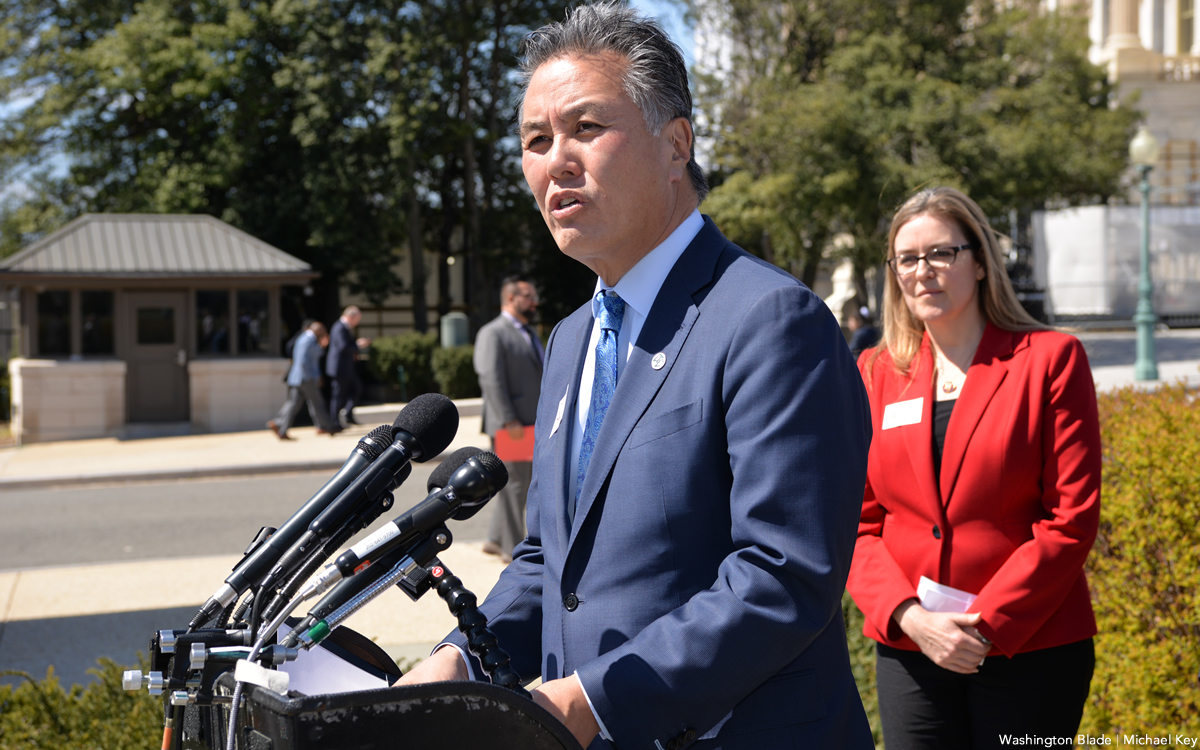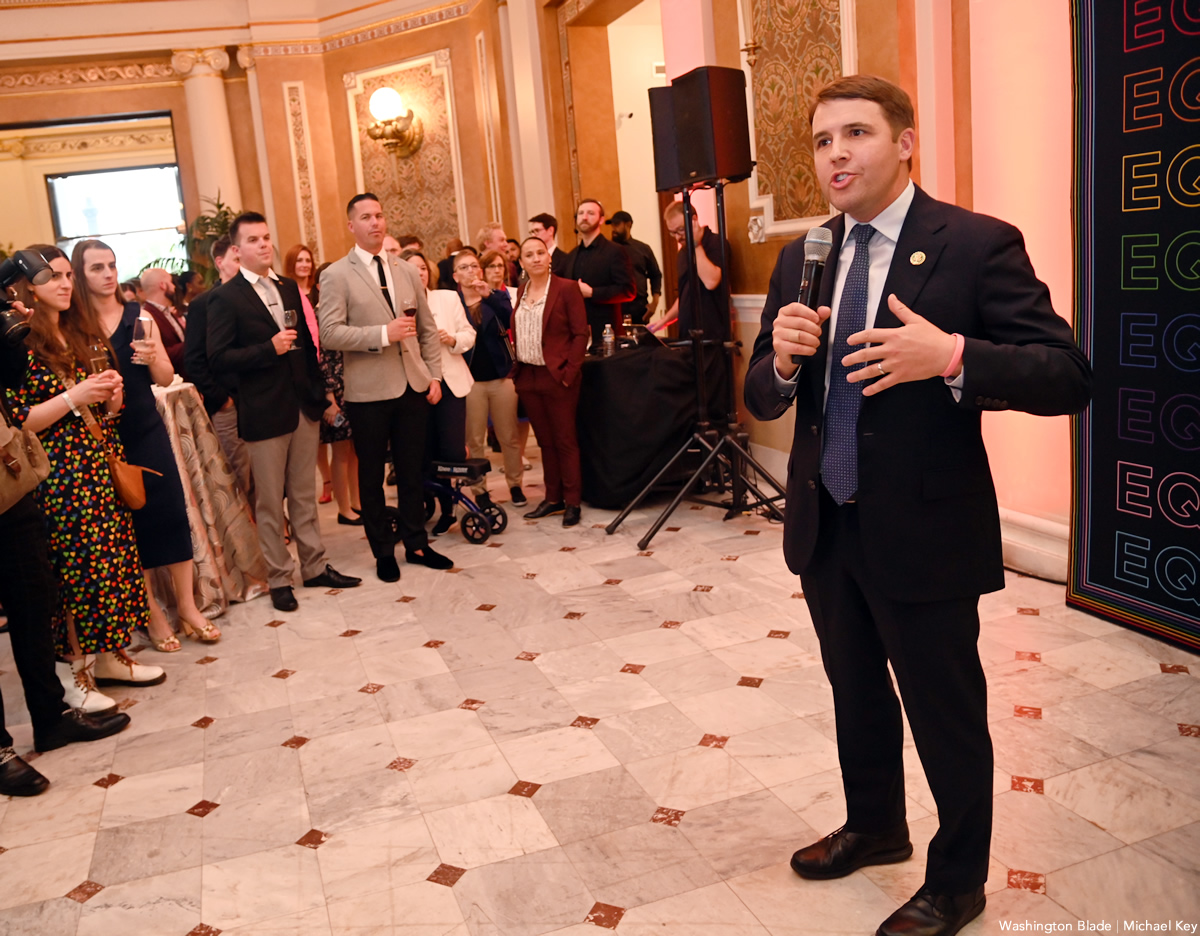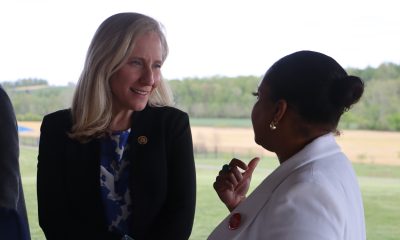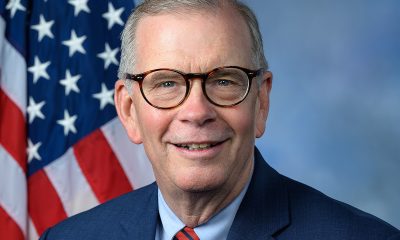Congress
Takano: Asian Development Bank LGBTQ, intersex safeguards are an ‘opportunity’
‘It’s not a radical thing’

California Congressman Mark Takano on Dec. 2 told the Washington Blade he is hopeful the Asian Development Bank will add sexual orientation and gender identity to the institution’s safeguards.
“I am optimistic that something like this can be done,” said Takano during a Zoom interview. “It’s not a radical thing. It’s very modest.”
The ADB, which is based in the Philippines, seeks to promote economic and social development through the Asia-Pacific Region.
Ambassador Chantale Wong, who is the ADB’s U.S. director, is the first openly lesbian American ambassador. Takano, a Democrat who will represent California’s 39th Congressional District in the next Congress, is openly gay.
The Treasury Department has endorsed the safeguard that Takano said he expects “to come to a head” in the spring of 2023. Takano and other members of the Congressional Asian Pacific American Caucus and the Congressional LGBT+ Equality Caucus — U.S. Reps. Judy Chu (D-Calif.), Ro Khanna (D-Calif.), Raja Krishnamoorthi (D-Ill.), Grace Meng (D-N.Y.), Pramila Jayapal (D-Wash.), Andy Kim (D-N.J.) and Ted Liu (D-Calif.) — in an Oct. 14 letter to ADB President Masatsugu Asakawa expressed their “strong support for the creation of a standalone gender and sexual orientation, gender identity and expression and sex characteristics (SOGIESC) safeguard in the Asian Development Bank (ADB)’s updated Safeguard Policy Statement.”
“The inclusion of such a safeguard presents an opportunity for the ADB to lead by example among multilateral development banks (MDBs) in a region of the world where civil society has been at the fore of pushing positive change for sexual minorities,” reads the letter.
“The explicit inclusion and protections for sexual and gender minorities in this proposed safeguard are not only beneficial for the economic and social development of the region, but would also open further opportunities for investment,” it adds.
Takano noted the ADB would be the first multilateral development bank to add sexual orientation and gender identity to its safeguards.
“This is an opportunity for the ADB to be a leader among MDBs globally,” reads the letter. “As Asian Americans and advocates for the LGBTQI+ population here in the United States, we are eager to see the ADB spearhead the establishment of necessary protections for the international LGBTQI+ community that will allow them to participate in civic life more fully.”
President Joe Biden in 2021 issued a memo that committed the U.S. to promoting LGBTQ and intersex rights abroad as part of his administration’s overall foreign policy.
Wong and Takano were both at the American Chamber of Commerce in Singapore on Aug. 1 when U.S. House Speaker Nancy Pelosi (D-Calif.) spoke in support of LGBTQ and intersex rights.
The speech coincided with a Congressional delegation to Singapore, Malaysia, Taiwan, South Korea and Japan that Pelosi led. Singapore Prime Minister Lee Hsien Loong on Aug. 21 announced his country will decriminalize consensual same-sex sexual relations. Lawmakers in the Southeast Asian city-state late last month repealed the colonial-era sodomy law, and approved a constitutional amendment that defines marriage as between a man and a woman.
Same-sex couples have been able to legally marry in Taiwan since 2019. Lawmakers in Indonesia on Tuesday approved a new Criminal Code that would, among other things, criminalize sex outside of marriage.
Qatar, which is hosting the 2022 World Cup, is among the countries in which consensual same-sex sexual relations remain punishable by death.
Takano over the Thanksgiving holiday led a Congressional delegation to Jordan, Kuwait, Iraq and Lebanon. The Council for Global Equality notes homosexuality is still criminalized in Kuwait and Lebanon. Discrimination and persecution based on sexual orientation and gender identity remains commonplace in all four of the Middle Eastern countries that Takano visited.
“Different parts of Asia are showing signs of huge progress in terms of governance and recognizing LGBTQIA+ minorities and recognizing their humanity,” Takano told the Blade, while noting 60 percent of the world’s population lives in Asia. “Being able to embed safeguards into Asian Development Bank standards and how they approve projects and implement projects could be a huge leap forward in terms of achieving new standards in all these countries with regards to LGBTQ people in Asian nations.”
“This is very exciting,” he added.
Takano also specifically praised the Biden administration, American diplomats and Wong herself for their efforts to advance LGBTQ and intersex rights
“(U.S. foreign missions) find ways to create safe spaces for LGBTQ people in those countries to be able to come together, to talk,” said Takano. “To have someone like Ambassador Wong lead that is very important and that the administration supports the efforts of Ambassador Wong is not surprising.”
“What a difference it makes to have President Biden and Vice President Harris, but not only have they with their words said they support our community, they’ve also appointed people like Amb. Wong, who is actually taking actions,” he added. “She’s using the levers and dials of her office to take a step forward.”
GOP support for Respect for Marriage Act ‘an unexpected turn’
Takano spoke with the Blade two days after the Respect for Marriage Act passed in the U.S. Senate by a 61-36 vote margin, with 12 Republicans supporting it.
More than 40 Republicans in the U.S. House of Representatives voted for the Respect for Marriage Act in July. A final vote could take place in the chamber as early as Thursday.
“We were reeling from that Supreme Court decision on Roe and the comments in Justice Thomas’ concurring opinion,” said Takano. “Boy oh boy did we in Congress say that we need to protect what we can. The Respect for Marriage Act is making sure we protect same-sex marriages, but also protect interracial marriages.”
Takano conceded Republican support for the bill “is kind of an unexpected turn in this Congress,” even though a majority of GOP lawmakers opposed it. Takano also acknowledged public opinion has shifted significantly in support of marriage equality over the last decade.
“This court has shown it’s pretty radical,” he said. “I’m happy that we have a way to make sure that existing marriages are protected.”
Congress
Democratic lawmakers travel to El Salvador, demand information about gay Venezuelan asylum seeker
Congressman Robert Garcia led delegation

California Congressman Robert Garcia on Tuesday said the U.S. Embassy in El Salvador has agreed to ask the Salvadoran government about the well-being of a gay asylum seeker from Venezuela who remains incarcerated in the Central American country.
The Trump-Vance administration last month “forcibly removed” Andry Hernández Romero, a stylist who asked for asylum because of persecution he suffered because of his sexual orientation and political beliefs, and other Venezuelans from the U.S. and sent them to El Salvador.
The White House on Feb. 20 designated Tren de Aragua, a Venezuelan gang, as an “international terrorist organization.” President Donald Trump on March 15 invoked the Alien Enemies Act of 1798, which the Associated Press notes allows the U.S. to deport “noncitizens without any legal recourse.”
Garcia told the Washington Blade that he and three other lawmakers — U.S. Reps. Maxwell Alejandro Frost (D-Fla.), Maxine Dexter (D-Ore.), and Yassamin Ansari (D-Ariz.) — met with U.S. Ambassador to El Salvador William Duncan and embassy staffers in San Salvador, the Salvadoran capital.
“His lawyers haven’t heard from him since he was abducted during his asylum process,” said Garcia.
The gay California Democrat noted the embassy agreed to ask the Salvadoran government to “see how he (Hernández) is doing and to make sure he’s alive.”
“That’s important,” said Garcia. “They’ve agreed to that … we’re hopeful that we get some word, and that will be very comforting to his family and of course to his legal team.”

Garcia, Frost, Dexter, and Ansari traveled to El Salvador days after House Oversight and Government Reform Committee Chair James Comer (R-Ky.) and House Homeland Security Committee Chair Mark Green (R-Tenn.) denied their request to use committee funds for their trip.
“We went anyways,” said Garcia. “We’re not going to be intimidated by that.”
Salvadoran President Nayib Bukele on April 14 met with Trump at the White House. U.S. Sen. Chris Van Hollen (D-Md.) three days later sat down with Kilmar Abrego Garcia, a Maryland man who the Trump-Vance administration wrongfully deported to El Salvador on March 15.
Abrego was sent to the country’s Terrorism Confinement Center, a maximum-security prison known by the Spanish acronym CECOT. The Trump-Vance administration continues to defy a U.S. Supreme Court ruling that ordered it to “facilitate” Abrego’s return to the U.S.
Garcia, Frost, Dexter, and Ansari in a letter they sent a letter to Duncan and Secretary of State Marco Rubio on Monday demanded “access to” Hernández, who they note “may be imprisoned at” CECOT. The State Department has not responded to the Blade’s request for comment about the correspondence.
Garcia said the majority of those in CECOT who the White House deported to El Salvador do not have criminal records.
“They can say what they want, but if they’re not presenting evidence, if a judge isn’t sending people, and these people have their due process, I just don’t understand how we have a country without due process,” he told the Blade. “It’s just the bedrock of our democracy.”

Garcia said he and Frost, Dexter, and Ansari spoke with embassy staff, Salvadoran journalists and human rights activists and “anyone else who would listen” about Hernández. The California Democrat noted he and his colleagues also highlighted Abrego’s case.
“He (Hernández) was accepted for his asylum claim,” said Garcia. “He (Hernández) signed up for the asylum process on an app that we created for this very purpose, and then you get snatched up and taken to a foreign prison. It is unacceptable and inhumane and cruel and so it’s important that we elevate his story and his case.”
The Blade asked Garcia why the Trump-Vance administration is deporting people to El Salvador without due process.
“I honestly believe that he (Trump) is a master of dehumanizing people, and he wants to continue his horrendous campaign to dehumanize migrants and scare the American public and lie to the American public,” said Garcia.
Congress
Goodlander endorses Pappas’s Senate bid
Announcement puts gay congressman on the path to securing his party’s nomination

U.S. Rep. Maggie Goodlander (D-N.H.) on Thursday announced she will not run to represent her state in the U.S. Senate, endorsing gay U.S. Rep. Chris Pappas’s (D-N.H.) bid for the seat of retiring U.S. Sen. Jeanne Shaheen, putting him on the path to secure the Democratic nomination.
“We are in the fight of our lifetimes right now, of a moment of real crisis and challenge,” she said. “I feel humbled and grateful to so many people across our state who have encouraged me to take a look at the U.S. Senate, and after a lot of thought and conversations with people I love and people I respect and people who I had never met before, who I work for in this role right now, I’ve decided that I’m running for re election in the House of Representatives.”
When asked by a reporter from the ABC affiliate station in New Hampshire whether she would endorse Pappas, Goodlander said, “Yes. Chris Pappas has been amazing partner to me in this work and for many years. And I really admire him. I have a lot of confidence in him.”
She continued, “He and I come to this work, I think with a similar set of values, we also have really similar family stories. Our families both came to New Hampshire over 100 years ago from the very same part of northern Greece. And the values that he brings to this work are ones that that I really, really admire. So I’m proud to support him, and I’m really excited to be working with him right now because we’ve got a lot of work to do.”
Today in Salem @MaggieG603 tells @WMUR9 she is not running for U.S. Senate & endorses @ChrisPappasNH #NHPolitics #NHSen #NH02 #WMUR pic.twitter.com/W2CMrhRuIC
— Adam Sexton (@AdamSextonWMUR) April 17, 2025
“Maggie Goodlander has dedicated her career to service, and we can always count on her to stand up to powerful interests and put people first,” Pappas said in a post on X. “I’m so grateful to call her my friend and teammate, and I’m proud to support her re-election and stand with her in the fights ahead.”
Earlier this month, former New Hampshire Gov. Chris Sununu, a Republican, announced he would not enter the Senate race, strengthening the odds that Democrats will retain control of Shaheen’s seat.
Congress
EXCLUSIVE: Garcia demands answers on deportation of gay Venezuelan asylum seeker
Congressman’s correspondence was shared exclusively with the Blade

U.S. Rep. Robert Garcia (D-Calif.) is demanding answers from the Trump-Vance administration on its deportation of Andry Hernández Romero, a gay Venezuelan makeup artist who was sent to a prison in El Salvador in violation of a federal court order and in the absence of credible evidence supporting the government’s claims about his affiliation with a criminal gang.
Copies of letters the congressman issued on Thursday to Immigration and Customs Enforcement and CoreCivic, a private prison contractor, were shared exclusively with the Washington Blade.
Garcia noted that Hernández, who sought asylum from persecution in Venezuela over his sexual orientation and political beliefs, had entered the U.S. legally, passed a preliminary screening, and had no criminal record.
Pro-bono lawyers representing Hernández during his detention in the U.S. pending an outcome in his asylum case were informed that their client had been removed to El Salvador a week after he failed to show for a hearing on March 13.
Hernández’s family now fears for his safety while he remains in El Salvador’s Terrorism Confinement Center (CECOT), which has a well documented record of human rights abuses, Garcia said.
Additionally, the congressman wrote, while experts say Tren de Aragua does not use tattoos as identifiers, the “primary evidence” supporting Hernández’s deportation based on his supposed links to the transnational Venezuelan gang “appears to have been two crown tattoos labeled ‘Mom’ and ‘Dad,’ which are common cultural symbols in his hometown.”
The determination about his links to or membership in the organization was made by a CoreCivic employee whose criminal record and misconduct as a law enforcement officer led to his termination from the Milwaukee Police Department, Garcia wrote in his letter to the company.
Requesting a response by May 1, the congressman asked CoreCivic President Damon T. Hininger to address the following questions:
- What qualifications and training does CoreCivic require for employees tasked with making determinations about detainees’ affiliations?
- What protocols are in place to ensure that determinations of gang affiliation are based on credible and corroborated evidence?
- How does CoreCivic oversee and review the decisions made by its employees in such critical matters?
- What mechanisms exist to prevent and address potential misconduct?
- What is the nature of CoreCivic’s collaboration with ICE in making determinations that affect deportation decisions? Are there joint review processes?
- What background checks and ongoing assessments are conducted for employees involved in detainee evaluations, particularly those with prior law enforcement experience?
- What guidelines does CoreCivic follow regarding the use of tattoos as indicators of gang affiliation, and how does the company ensure that cultural or personal tattoos are not misinterpreted?
In his letter to Tae D. Johnson, acting director of ICE, Garcia requested answers to the following questions by May 1:
- Did ICE personnel independently review and approve the determination made by CoreCivic employee Charles Cross Jr. identifying Mr. Hernández Romero as a member of the Tren de Aragua gang?
- What evidence, beyond Mr. Hernández Romero’s tattoos, was used to substantiate the claim of gang affiliation?
- Under what legal authority are private contractors like CoreCivic permitted to make determinations that directly impact deportation decisions?
- What vetting processes and background checks are in place for contractors involved in such determinations? Are there oversight mechanisms to ensure their credibility and adherence to due process?
- What guidelines does ICE follow regarding the use of tattoos as indicators of gang affiliation, and how does the company ensure that cultural or personal tattoos are not misinterpreted?
Together with U.S. Rep. Maxwell Frost (D-Fla.), Garcia wrote to U.S. Rep. James Comer (R-Ky.) on Tuesday requesting permission to bring a congressional delegation to CECOT for purposes of conducting a welfare check on detainees, expressing specific concern for Hernández’s wellbeing. The congressmen said they would “gladly include any Republican Members of the committee who wish to participate.”
Hernández’s case has drawn fierce criticism of the Trump-Vance administration along with calls for his return to the U.S.
Influential podcaster and Trump ally Joe Rogan spoke out in late March, calling the deportation “horrific” and “a horrible mistake.”
Last week, California Gov. Gavin Newsom (D) sent a letter to Kristi Noem, secretary of the U.S. Homeland Security, which manages ICE, demanding Hernández’s immediate return and raising concerns with the right to due process amid the administration’s crackdown on illegal immigration.
Hernández “was denied the opportunity to defend himself against unsubstantiated allegations of gang involvement or to present his asylum claim,” the governor wrote. “We are not a nation that sends people to be tortured and victimized in a foreign prison for public relations victories.”
Immigrant Defenders Law Center President Lindsay Toczylowski, who is representing Hernández, has not been able to reach her client since his removal from the U.S., she told NBC News San Diego in a report published April 11.
“Under the Constitution, every single person has a right to due process, and that means they have a right to notification of any allegations the government is making against them and a right to go into court and prove that those allegations are wrong if that’s the case,” she said. “In Andry’s case, the government never gave us that opportunity. In fact, they didn’t even bring him to court, and they have forcefully sent him to El Salvador without ever giving us any notice or without telling us the way that we could appeal their decision.”
“CECOT, this prison where no one has ever left, where people are held incommunicado, is a very dangerous place for someone like Andry,” Toczylowski said.
In March, a DHS spokesperson posted on X that Hernández’s “own social media indicates he is a member of Tren de Aragua,” though they did not point to any specific posts and NBC reported that reviews of his known social media accounts turned up no evidence of gang activity.
During a visit to CECOT in March, Time Magazine photographer Philip Holsinger photographed Romero and reported that the detainee plead his innocence — “I’m not a gang member. I’m gay. I’m a stylist.” — crying for his mother as he was slapped and his head was shaved.
-

 U.S. Federal Courts4 days ago
U.S. Federal Courts4 days agoFederal judge blocks Trump passport executive order
-

 Obituary5 days ago
Obituary5 days agoLocal attorney, LGBTQ rights advocate Dale Sanders dies at 75
-

 Mexico5 days ago
Mexico5 days agoGay couple claims Puerto Vallarta wedding venue discriminated against them
-

 Books4 days ago
Books4 days ago‘Pronoun Trouble’ reminds us that punctuation matters











